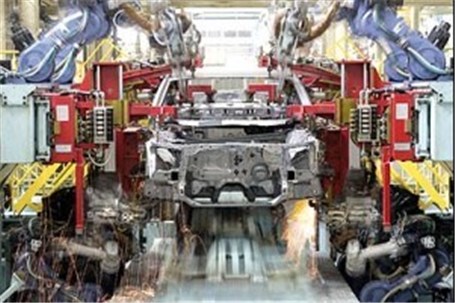
- Friday 31 July 2015 - 16:57:00
European car makers strives to regain share in Iran's auto market
Asre Khodro: Iran’s automobile industry is expected to prosper following the removal of the international sanctions from the country under the recent nuclear deal between P5+1 and Iran.
Reporting "Asre Khodro", The race has tightened for foreign automakers' access to Iran’s auto market. European manufacturers, which were forced to leave the Iranian market under international sanctions, are now in talks with the Islamic Republic to regain a share in Iran’s vast car market.
German company Mercedes-Benz plans to purchase a 30 percent stake in Iranian Diesel Engine Manufacturing Company in order to produce autos in the city of Tabriz.
Hashem Yekeh Zareh, the CEO of Iran Khodro Industrial Group has said Iran and Mercedes-Benz would sign a 10-year agreement to produce trucks and buses in Iran.
He also mentioned that a recent trip by a German delegation headed by Germany's Minister for Economic Affairs and Energy Sigmar Gabriel and separate trip by a French delegation headed by Foreign Minister Laurent Fabius to Tehran indicate the importance of Iran's auto market to foreign manufacturers.
Yekeh Zareh said that German Mercedes-Benz was a major partner for Iran before sanctions, and the company seeks to re-open its office in Tehran within next two to three months.
He also added that Mercedes-Benz wants to purchase 50 percent of Setar-Iran company (Iran Start) and sign a 5-year agreement to produce sedans.
The other leading German carmakers are also willing to return the Iranian market should the sanctions on Iran are lifted.
An Iranian official said Volkswagen could also become a reliable partner for Iran, in meantime adding that Iran Khodro may sign a deal with German Daimler AG to produce commercial vehicles and luxury cars as soon as three to four months from now.
Representatives from the French automobile industry were also striving to restore their previous share of the Iranian auto market.
French Peugeot wants to establish a 50-50 joint venture with Iran to produce car. Iranian officials said the French auto giant Peugeot is already in advanced stages of talks to provide parts to the leading Iranian carmaker Iran Khodro.
Yekeh Zareh said 30 percent of the cars produced would be exported, adding that French Peugeot and Renault as well as Japanese Suzuki have already agreed to return to Iran.
Iran, however, remains furious with the giant French carmaker Peugeot for withdrawing from the country in 2012 amid Western sanctions.
Yekeh Zareh said Iran will take its national interests into account and choose a partner that is strong and committed to its obligations.
The CEO of IKCO said that before sanctions Peugeot held 22 percent of Iran's car market, but withdrawal from Iran caused huge losses for the company.
The automobile industry accounts for nearly 10 percent of Iran’s gross domestic product. The latest data shows that Iran ranks 18th on the list of the world’s top auto manufacturers. However, the country’s automotive industry needs modernization after years of sanctions.
Sanctions on Iran hit the automotive industry hard, slicing production by 1 million units from its peak of 1.6 million in 2011 and leading to 100,000 job redundancies.
Iran is one of the biggest producers of cars in the region.
Source: AzerNews
- Iran automotive market
Sout Korea’s auto exports down 1.6% in Feb.
Renault to Return to Iran: Deputy Minister
Renault to stay in Iran despite US sanctions
M&M plans SUV foray into Iran
Automotive Industry in Iran, a short review
Automakers are forced to implement new car standards
Removing some price ranges from the car market
Renault Lead the Way, Nissan Climb
An End to Car Importing Suspension
The Renault partnership in Russia changes the investment location in Iran
No Cherry-Picking, All Low-Quality Cars Have to Go
Details of new rules for importing car to Iran
European carmakers on the road back to Iran after nuclear deal
Renault has reached to the top market for imported cars in Iran
Iran is the place for peugeot to jump the platform
What Future for Iran Car Market?
France’s Peugeot, Total Looking for Stronger Presence in Iran
French Leverage in Iran Auto Industry
Iran Carmakers Obliged to Offer 2-Year Guarantees
Over 13 million cars in use in Iran
Renault Imports to Iran Increase 110%
VW's Seat considers selling cars in Iran - CEO
Iran to Finalize Deal with Renault in Weeks: Minister
Iran Khodro Group Retains 39% Market Share
Iran stars as Renault powers to record 2016 sales
Renault Duster May Be Obsolete
VW to made CNG cars for Iran
Iran has potential to be top-10 auto market by 2020
Renault Sales in Iran Up by 127% in September
Volkswagen and Skoda look into Iran market entry
Renault Looks to Grow Automotive Presence in Iran
Iran’s Car Market: Heading High or Low?
Peugeot targets 150,000 vehicle sales in Iran in second half
A positive political environment has helped Iran’s car market
Peugeot to try for making Iran its manufacturing hub in Middle East, Africa
Germany’s Bavaria to dispatch trade delegation to Iran on Sept. 4
No request to raise the automobile's price is sound
Record Registrations for Groupe Renault in H1 2016
Automotive Targets Highlighted
How to seize Iran’s automotive opportunities
Renault’s Iranian market share rises 7-fold in post-sanction era
VW In Iran
Rouhani vows to privatize Iran’s car industry
VW and Skoda reportedly eyeing Iran as sanctions lift
Japanese traders seek new opportunities in Iran
Peugeot and Renault in pole position to enter Iran’s car market
Iran Opening Up, The New Land Of Opportunity
Picking winners in the race to Iran
Iran important market for European businesses: expert
Azerbaijan not impressed by car opportunities of Iran
Impact of Iran deal on the automotive market
Iran automotive market ‘on edge to take off’
Controversial Vehicle Price Surge in Iran
IKCO management handed over to consortium of non-governmental shareholders
Iran's government approved car import after four years
$2 Billion Aid Package to Bolster Automotive Industry
Renault sales decline 6.7% in first half of 2019
FIAT cars will be manufactured in Salafchegan, Iran
Car, mobile price fluctuations in Iran puzzling people
IKCO, Azad University Sign R&D Agreement
When will Azerbaijan start producing Peugeot 207?
Iran Annual Auto Output Report: 2018-19
Automotive Industry has exceeded the targets with “Automechanika Istanbul” which the World's 3rd Largest Fair!
Sout Korea’s auto exports down 1.6% in Feb.
Renault to Return to Iran: Deputy Minister
Chery's luxury brand will soon be on the market
Warm start for arrizo6 in Ahwaz







